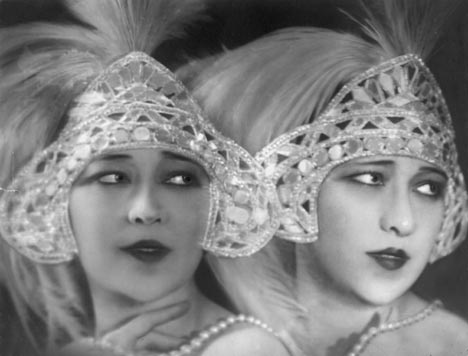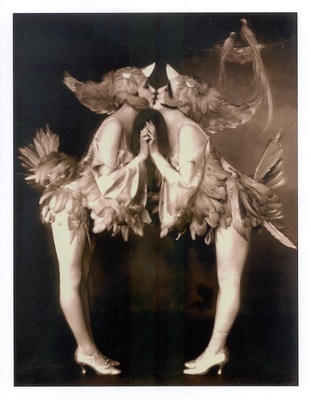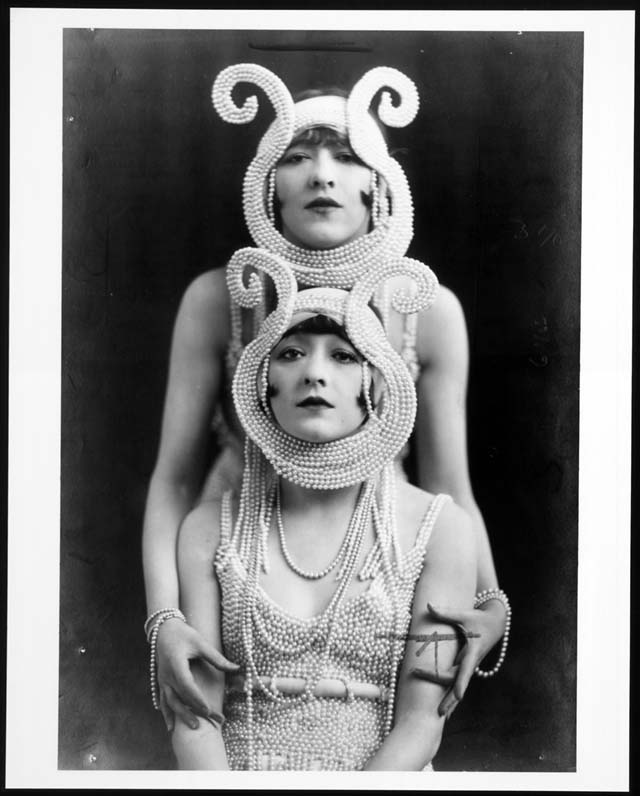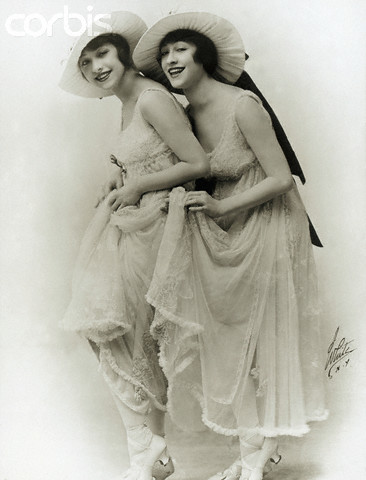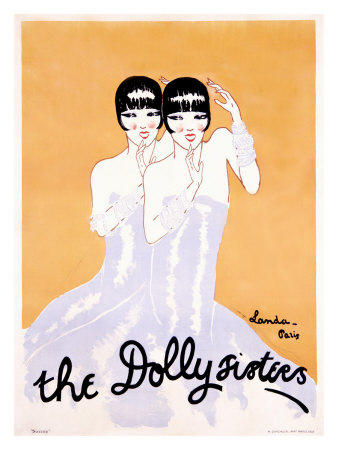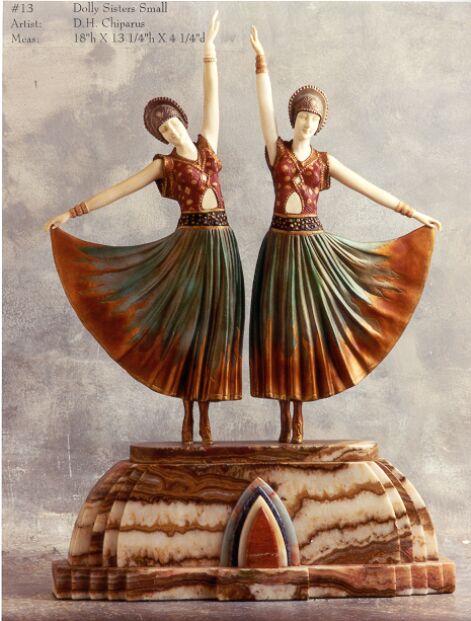The Dolly Sisters
Jennie Deli (1892-1941) and Rosie Deli (1892-1970)
Jennie Deli (Janka, "Jancsi") was born as Janka Deutsch on 25. October 1892. in Balassagyarmat, died on 6. January 1941. in New York. Her husbands: Harry Fox singer and dancer 1914 - 1921 (divorced), Bernard Vinissky 1935 - 1940 (divorced).
Rosie Deli (Rózsi) was born as Rózsi Deutsch on 25. October 1892. in Balassagyarmat, died on 1. January, 1970 in New York. Her husbands: Jean Schwartz 1913 - 1921 (divorced)
Mortimer Davis 1927 - 1931 (divorced), Irving Netcher 1932 - 1943 (died).
The Deutsch family of merchants moved to Budapest from Balassagyarmat in 1895, this time they changed their names ("magyarized") from Deutsch to Deli. In 1905 they emigrated to the United States and settled in New York. The twin girls, Janka and Rózsi, or as they used later in their career Jenny (Jancsi) and Rosie, attended a dance school and performed on a stage as professional dancers when they were fifteen. They started to dance in coffee houses becuse the family had to pay back the card debts of their uncle. In their performances they stepped up wearing same clothes, perfectly followed suit the dance moves of each other, using spectacular and witty elements of dance show so they became very successful in a few years.
They debuted on stage in the operetta "The Maid and the Millionaire" in 1907. Because of their age they were not allowed to perform in New York for two years. Therefore they joined the traveling revue called "Orpheum" and toured many cities of the the Midwest until 1909 when they returned to New York. They signed up to the Keith-revue and danced in Broadway plays and later in silent films.
In 1912 at Ziegfeld Follies they were already called as "Dolly twins". Jenny married to Harry Fox vaudeville-dancer and singer on 1914 who was their manager by this time. His name was associated with the invention of foxtrot dance and the Dolly Sisters played a major role of its presentation and interpretation. In relation of the dance, the appearance the hair style, the "Bob-hairstyle", long necklaces and the whole "foxtrot image" were strongly connected to the appearance of the Dolly Sisters at that time. In 1918 Harry Fox and the Dolly Sisters sang together the evergreen song "I'm Always Chasing the Rainbows" in a Broadway musical.
Excerpt from the movie "The Dolly Sisters" (1945). Betty Grable and John Payne as Jenny Dolly and Harry Fox.
They have first returned to Europe in 1920 and their fame far preceded their performance.
They introduced themselves to the British public in the Hippodrome in London as stars of Albert de Courville's variety show "Jigsaw". On 20. September 1920 they debuted in Paris. Later also in the British capital they stepped up in the productions "League of Notions" (1921) and "Babes in the Wood" (1921/22) with the management of the renowned Charles B. Cochran London producer. Sometimes they returned to the Broadway, but they've spent more and more time in Europe. In connection with their appearances tabloid newspapers were talking about fabulous sums of money. They became celebrated stars first at the French Riviera later in Paris, so after their success in the United States they've conquered the Old Continent. They were celebrated stars of the era both in America and in Europe, their popularity was beyond everything. In Paris they were one of the most hottest stars of the Casino de Paris.

In proportion of their fame they acquired an amazing wealth in a short space of time. Because of the very unstable global economic situation after World War I they regularly changed their artistic fees to diamonds and jewelry what they always carried with themselves in a small handbag (such as the fourth biggest polished diamond of the World that time, a seventy-two carats brilliant...) They regularly sacrificed significant amounts of their property to charities, for example to orphanages in Hungary and in France where among other things they've donated more than two million francs to the foundation of actors in Paris.
"How do I speak Hungarian? - Do I have the accent? Awful! I thought so far that I can speak in Hungarian... Because I speak several languages , English, French, German but the English say I speak English like a French, the French that I speak French as a German and the German that I speak German as an English. Well then I cannot speak any languages! That's terrible! " - as Jennie Dolly said. Another time she was looking for her hometown on a globe and couldn't find it... "You now, I bought in Periss a world and looky for Ballasadiarmath. Its terrible I could find it not, and that all night I was crying you now...?" that's how Jenny was speaking about her hometown. After many years they first returned to Hungary in 1923 . Later several times they visited home for a couple of days. In 1930 Jenny adopted a five- years-old girl in the orphanage of the Leauge for Child Protection and later took here to her name as Klárika (Claire) Dolly and also her playmate, Pötyi (Spottie) from the same institution. What has happened with the children, that is unknown.
In 1928 at top of their success, suddenly they retired from their career and never appeared again as Dolly Sisters. They claimed it to their age and that they were fed up with the show business. After their retirement Rosie married to to Mortimer Davis, son of a renowned Canadian tobacco-manufacturer. The secret marriage was revealed only after a year. Finally after four years they divorce because of the pressure of Mortimer's family. Meanwhile they live the social life of European millionares envied by many. Their life is going on in the medium of casinos, hotels, upscale ladies, noblemen, factory owners, bonvivants and bohemes. Jenny (Jancsi) was running a luxury fashion saloon on the Champs-Élysées in Paris for a while. In 1928 she bought the Singer Chatea from the famous sewing machine manufacturer family and opened a permanent lingerie-saloon. Later she founded a dance school for the support of young talents. on the spring of 1933 riding a car among the rocks of the French Riviera with Max Constant French pilot and movie star they met a severe accident. From the several painful and unsuccessful plastic surgeries she was unable to recover either mentally and physically. She was married to Bernard Vinissky and moved to Los Angeles, but the marriage was unhappy and ended with divorce. After 1940 she lived alone, and later in major depressive state in 1941 at age of 49 she commited suicide.
Rosie lived in Chicago with her new and rich husband, Irving Netcher until his death in 1943. After that shes ecluded herself from the world, became lonely. She died in a heart attack on the morning of New Years Day 1970.
"Red Rose" , the first operetta about their lives was published in 1928 in Hungary, by Békeffy and Lajtai which was presented in the Király Színház ("Royal Theater") with a huge success. At the same time with the Budapest premiere another operetta was also made in Berlin, Germany. It was composed by Ralph Benatzky and published to the public about a month later in Berlin in Grosse Schauspielhaus.
There were several movies made about their lives. The most famous of these was "The Dolly Sisters" in 1945. It was directed by Irving Cummings and nominated for Academy Award in the category of best music, original song in 1947.
In 1964 another movie in the Philippines was made about their romantic life history in Philippine language starring with Bella Flores and Susan Roces.
Their movies:
- The Merry Countess (1913)
- The Maid and The Millionaire (1913)
- The Call Of The Dance (Jenny) (1915)
- The Lilly and the Rose (1915)
- The Million Dollar Dollies (1918)
- The Tiger Girl (Lilly & the Rose) (1920)
- The Dolly Sisters (1945) (biographical movie)
Books:
- Dolly Sisters: Dance Till Dawn - USA (biopgraphical book)
Main stage shows:
In night clubs:
- Casino de Paris (1922)
- Jardin de Danse
- Lews
In theatre:
- Keith's Union Square Theater
- London Hippodrome (1922)
- Manhattan Opera House
- Palace Theatre (1921)
- Shubert Theatre (1924)
- Theatre Edouard VII
- Vienna Theater
- Ziegfeld Theater
Main shows in theatre:
- 1907 - The Maid and the Millionaire
- 1908/9 - Orpheum Vaudeville Circuit
- 1909 - Keith Vaudeville Circuit
- 1910 - The Echo (Rosie)
- 1911/12 - Ziegfeld Follies
- 1912 - The Merry Countess
- 1913 - Honeymoon Express (Jenny)
- 1914 - Hello Broadway (Rosie)
- 1914 - Whirl of the World (Rosie)
- 1916 - His Bridal Night (Rosie)
- 1924 - Greenwich Village Follies
- 1931 - Jeannette McDonald En Person (Jenny was Costumer in Paris)
- "Folies Bergere"
- "Oh LesBelles Filles"
- "Revue Moderne" (Casino deParis)
Sources:
- Színészkönyvtár ("Actors' library" edited by István Takács, 2006.) - in Hungarian
 Rosie Deli
Rosie Deli Jenny Deli
Jenny Deli - Confetta's Photo Library
- Confetta's Photo Library - Pumpkin Paradise - Blog of Gabriella Parádi - in Hungarian
(Yechiel)
Back to the page of the famous jewish personalities




